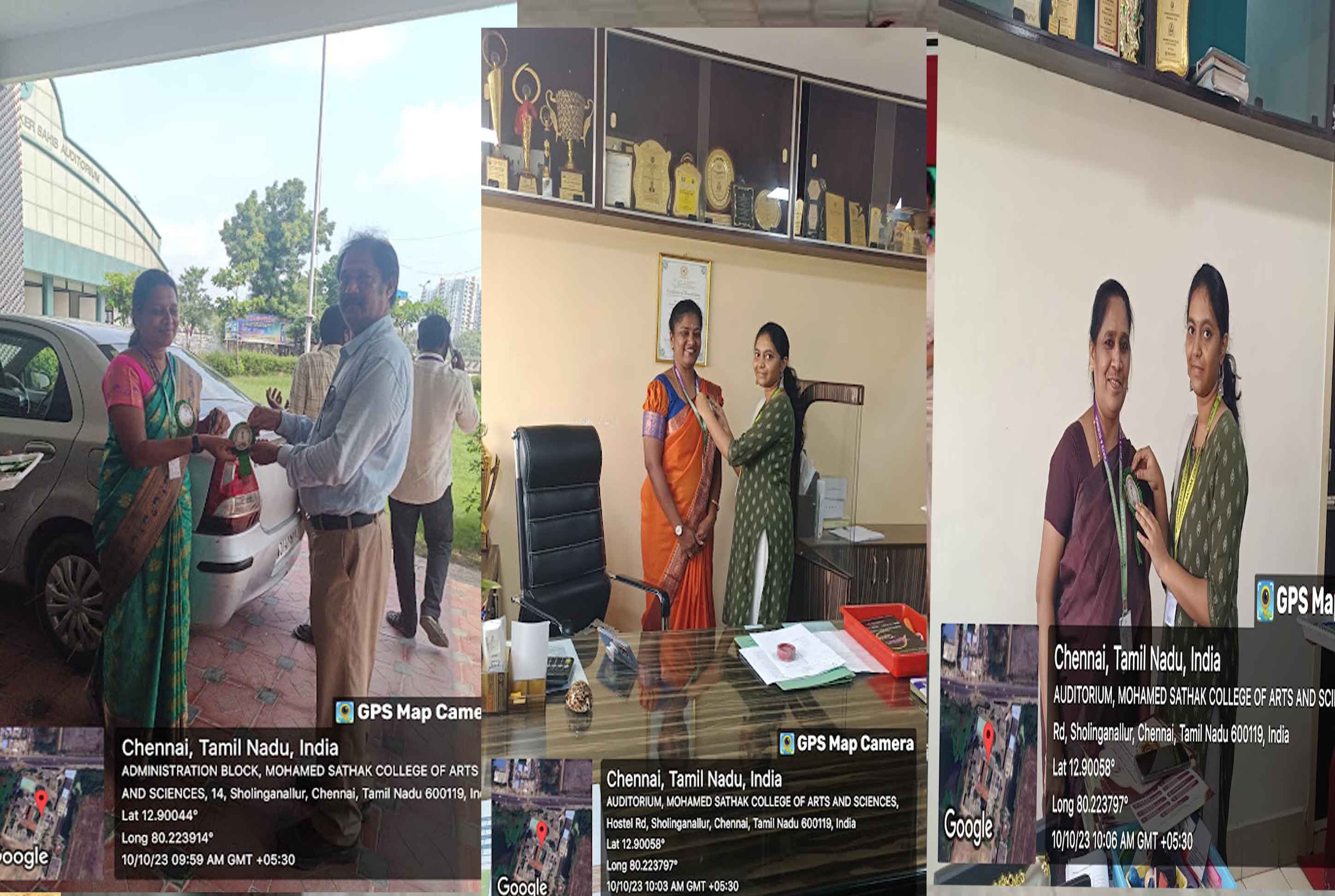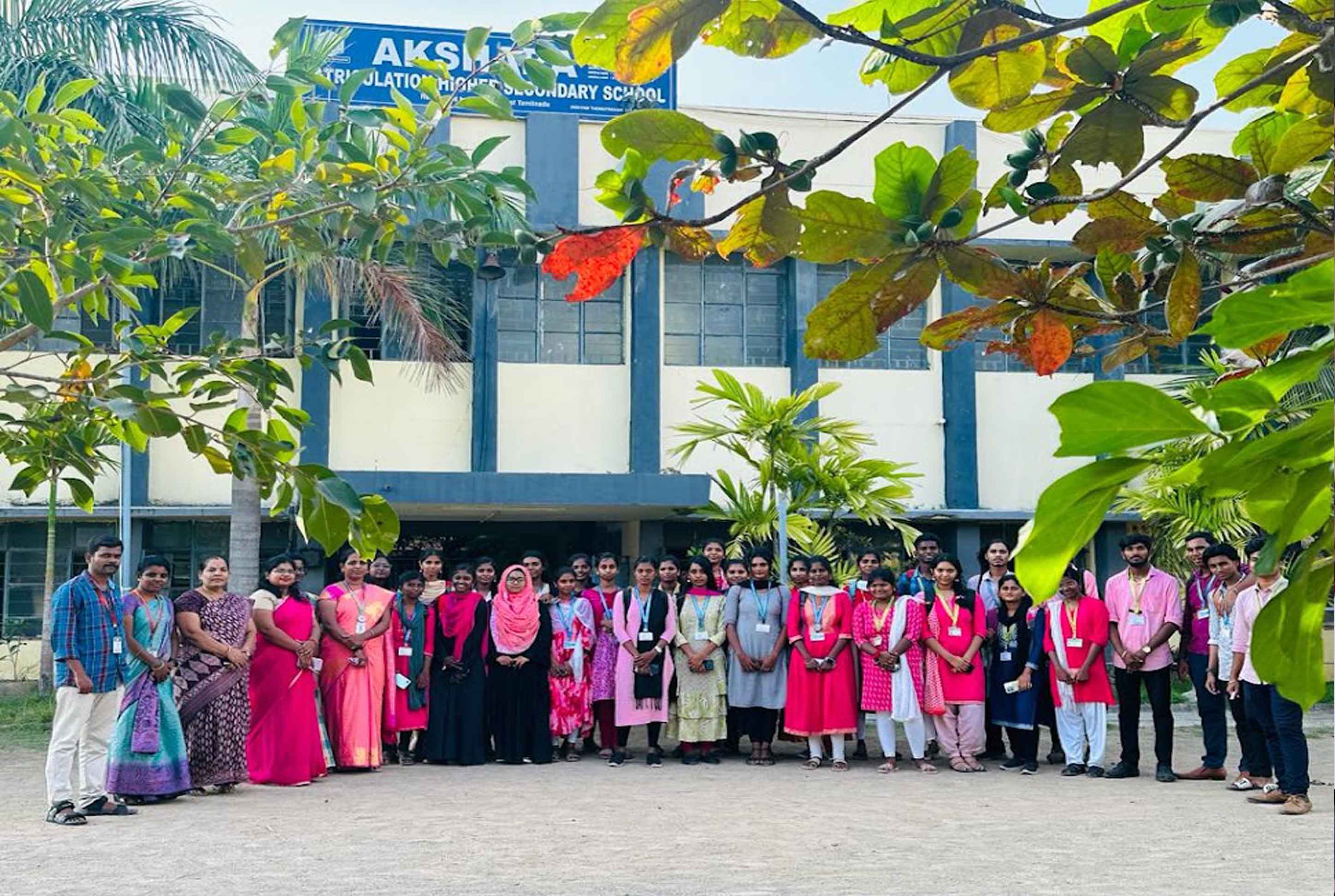Overview
Department of Corporate Secretaryship was established in 2015. The Department of Corporate Secretaryship is an active and vibrant department with good track record for the past 7 years. Focus on a better curriculum in order to produce well qualified professionals who are abreast of corporate sector. The B.Com CS course is offered so as to reflect in progressing in fields of business marketing, Income tax, Company law, and Entrepreneurship law and other technological trends as increasing demands of the job markets. The department is working to enrich and strengthen the young talents by producing competent student to excel in corporate and entrepreneurial skills. In order to incorporate values besides classroom teaching the students are exposed to ample opportunities like, interaction with leading industries. Project work, paper Presentation etc. Job oriented certificate course and, Personality aptitude carrier enhancement, Facilitate the students to compete in the current developing scenario. The students of the department have excelled in both academics as well as extra-curricular activities. This program is particularly suitable for individuals interested in pursuing careers as corporate secretaries or working in corporate legal and governance roles.
Programme
Duration:
3 years (Regular)
No. of Semesters:
6 (Regular)
Eligibility:
Higher Secondary preferably Science Stream
Career Opportunities:
Professionals like CA, CMA and ACS,Work in Auditing Firms, Portfolio Management Companies, Marketing Manager,Entrepreneur,Portfolio Manager,Internal Auditor
Vision
To build competent professionals of Company Secretaries with Quality education, relevant knowledge, skills and training of corporate Secretaryship.
To expose our students to practical situations in companies for the purpose of imparting employability skills with emphasis on the professional ethics and values.
To enable the students in carrying out action oriented research in corporate sector.
Mission
“To be a Leader in the development of professionals in corporate governance”.
To provide a high standard of education
To develop the professional skills of students which are of immense value.
OBJECTIVE
The Department is working to enrich and strengthen the young talents by producing competent students to excel in corporate and entrepreneurial skills. Job oriented certificate courses facilitate the students to compete in the current developing scenario.
The Course places special emphasis on addressing real-life business issues where students are exposed to case studies and specific problems drawn from the Industry and encourages them to find solutions. It includes discussion on the latest developments in the business world.
To develop the professional skills of students which are of immense value.
Highlights:
PEOs / PSOs / PO
Programme Educational Objectives (PEOs)
| PEO1. | This program offers extensive exposure to subjects in Commerce, Accountancy, and Management, preparing students for entry-level positions in various industries. It not only facilitates the advancement of their professional careers but also nurtures entrepreneurship, making them valuable contributors to the economic development of the country. |
| PEO2. | The objective of this course is to empower students with the knowledge to comprehend and contribute to the strategic operational policies and practices of managing commercial banks within a competitive landscape. |
| PEO3. | This course equips students to pursue diverse roles in the banking and financial services sector, serving as a foundation for those aspiring to pursue advanced education in areas such as Commerce, Banking, and Management. |
| PEO4. | Offering a comprehensive framework for bank valuation, this course establishes the foundation for discussions on value-based bank management. It delves into topics such as the factors influencing bank value, a detailed analysis of deposit and loan pricing, and the intricacies of risk management in the banking sector. |
Program Specific Outcomes (PSOs)
| PSO1. | Placement: To prepare the students who will demonstrate respectful engagement with others’ ideas, behaviours, and beliefs and apply diverse frames of reference to decisions and action. Further the students are encouraged with add-on value based and job-oriented courses which ensure them to sustain in the organisation level. |
| PSO2. | Contribution to Business World: Apply theoretical concepts to business practices to produce employable, ethical, and innovative professionals to sustain in the dynamic business world. |
| PSO3. | Contribution to Business World: Apply theoretical concepts to business practices to produce employable, ethical, and innovative professionals to sustain in the dynamic business world. |
Programme Outcomes (PO)
| PO1. | Disciplinary knowledge: Capable of demonstrating comprehensive knowledge and understanding of one or more Disciplines that form a part of an Undergraduate Programme of Study. |
| PO2. | Communication Skills: Ability to express thoughts and ideas effectively in writing and orally; Communicative with others using appropriate media: confidently share one’s views and express herself / himself; demonstrate the ability to listen carefully, read and write analytically and present complex information in a clear and concise manner to different groups. |
| PO3. | Critical Thinking: Capability to apply analytic thought to the body of knowledge; analyse and evaluate evidence, arguments, claims, beliefs on the basis of empirical evidence; identify relevant assumptions or implications; formulate coherent arguments; critically evaluate practices, policies and theories by following scientific approach to knowledge development. |
| PO4. | Problem Solving: Capacity to extrapolate from what one has learnt and apply their competencies to solve different kinds of non- familiar problems, rather than replicate curriculum content knowledge; and apply one’s learning to real life situations. |
| PO5. | Analytical Reasoning: Ability to evaluate the reliability and relevance of evidence; identify logical flaws and holes in the arguments of others; analyse and synthesize data from the variety of sources; draw valid conclusion and support them with evidence and examples and addressing opposing viewpoints. |
| PO6. | Research- related skill: A sense of inquiry and capability for asking relevant/appropriate questions, problem arising, synthesising and articulating, Ability to recognise cause and effect relationships, define problems, formulate hypothesis, analyse and interpret and draw conclusions from data, establish hypothesis, predict cause and effect relationships, execute and report the results of an experiment or investigation. |
| PO7. | Co-operation/Team work: Ability to work effectively and respectfully with diverse teams; facilitate cooperative or coordinated effort on the part of a group, and act together as a group or a team in the interests of a common cause and work efficiently as a member of the team. |
| PO8. | Scientific reasoning: Ability to analyse, interpret and draw conclusions from quantitative or qualitative data: and critically evaluate ideas, evidence and experiences from an open minded and reasoned perspective. |
| PO9. | Reflective thinking: Critical sensibility to lived experiences, with self- awareness and reflexivity of both self and society. |
| PO10. | Information/Digital Literacy: Capability to use ICT in variety of learning situations, demonstrate ability to access, evaluate and use a variety of relevant information sources, and use appropriate software for analysis of data |
| PO11. | Self- directed learning: ability to work independently, identify appropriate resources required for a project and manage a project through to completion. |
| PO12. | Multicultural competence: Posses knowledge of values and belief of multiple cultures and global perspective: and capability to effectively engage in a multicultural society and interact respectfully with diverse groups. |
| PO13. | Moral and Ethical awareness /reasoning: Ability to embrace moral/ethical values in conducting one’s life, formulate a position/argument about an ethical issue from multiple perspectives and use ethical practices in all work. Capable of demonstrating the ability to identify ethical issue’s related to one’s work, avoid unethical behaviour such as fabrication, falsification or misrepresentation of data or committing plagiarist, not adhering to intellectual property rights; appreciating environmental and sustainability issues; and adopting objective, unbiased and truthful actions in all aspects of work. |
| PO14. | Leadership readiness/qualities: Capability for mapping out the task of the team or an organisation, and setting direction, formulating and inspiring vision, building a team who can help achieve the vision, motivating and inspiring team members to engage with that vision and using management skill to guide people to the right destination in a smooth and efficient way. |
| PO15. | Life Long Learning: Ability to acquire knowledge and skills, including “learning how to learn”,that are necessary for participating in learning activities throughout life, through self- paced and self-directed learning aimed at personal development, meeting economic, social and cultural objectives and adapting to changing trades and demands of workplace through knowledge/skill development/reskilling. |
Programme
Duration:
3 years
No. of Semesters:
6
Career Opportunities:
Cruise line | Railways | Airlines | Aboard | Hotels & Resorts | Hospitals | Industrial Canteen
Faculty
FACILITIES
Psychology Laboratory:
The Laboratory is well equipped and most advanced instruments available to teach and learn about human cognitive process, personality, behavior, emotions etc., also analysing the specific factors that influence and to determine the human mental, emotional, and behavioral states within the human population. It contains a variety of psychological instruments, such as experimental tools, questionnaires etc., Our Undergraduate students learn how to administer and applying psychological tests in counselling related fields and in organizations, which adds substantially to their range of professional skills. Some of the validated tests are available in our laboratory like Bhatia’s Battery of performance test of Intelligence, Muller Lyer Apparatus, Tachistoscope etc..,
Library:
The Department of Psychology possesses its own library. The library contains 250 textbooks covering all subjects of psychology like General Psychology, Developmental Psychology, Research Methodology, Biological Psychology, Social Psychology, Personality and counseling etc. We have both International Journals, National Journals and Articles to motivate our students to get practical and research exposure. It helps them to gain more knowledge about how our mind functions based on the situations and applying therapies to improve human’s physical, mental, emotional, moral and behavioral part. It provides insights to students on a range of discipline related subjects.
ICT Classroom:
ICT - enabled classrooms provide an engaging, innovative, and inclusive learning environment, in which the teachers and students can exchange their ideas and information in a variety of communication styles and formats. The use of ICT tools such as a projector and speaker enhances the delivery of the information deliberately and interestingly too. In the Department of Psychology, we offers ICT Classroom for our students to enhance their learning experience by providing the different kind of resources, materials, and learning tools etc., This facilities aims to increase the student engagement and motivation also creating an opportunities for learning, improves their concentration and comprehension level too. Also, it enhance them to understand the concepts easily and smart.
Rank Holders
Department Of Hotel and Catering Management
-
Academic Year Student Name Rank 2019-2022 Deepak .T 4 2018-2021 Jegadev.S 3 2016-2019 Kishorkannan.S 3 2016-2019 Sourotu Santosh Kumar 5 2015-2018 Kunduru Sanjay Reddy 20 2014-2017 Syed Mohamed Fayaz.MAK 17 2014-2017 Zamsith Ahamed.S.T 66 2013-2016 Srinath.M 6















